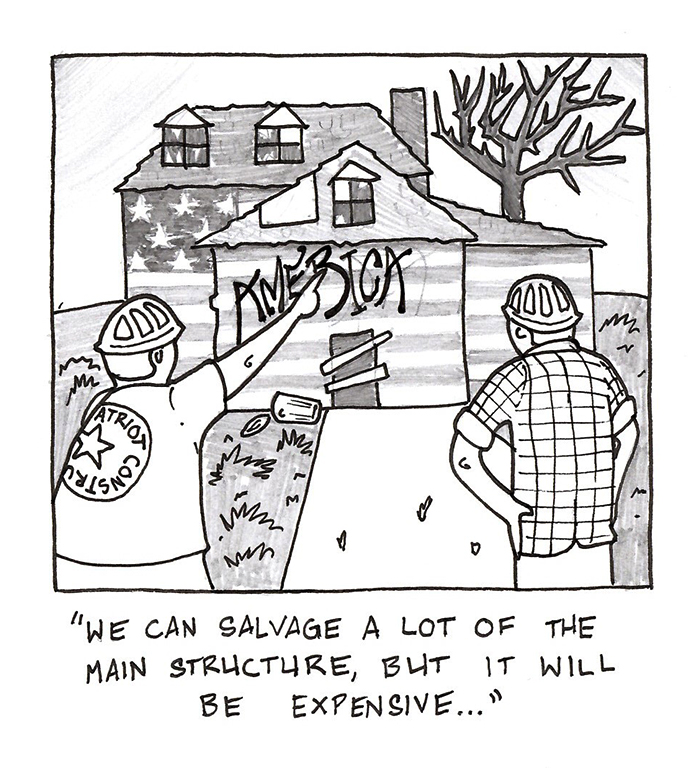Full to flawed: America’s democracy
NICK SANDIFER | Evergreen cartoonist
America was downgraded to a flawed democracy by the Economist shortly after President Trump’s election.
February 7, 2017
We no longer live in a full democracy. Indeed, our institutions of popular government have exposed deep flaws, even those at this university.
The Economist agrees. Each year, the Economist Intelligence Unit publishes its Democracy Index, reflecting on global political trends. The index itself is a score between one and 10. Countries are lumped into four blocks: full democracies (10.00-8.00), flawed democracies (7.99-6.00), hybrid regimes (5.99-4.00) and authoritarian regimes (3.99-1.00).
The score for each country is an average derived from five categories: electoral process and pluralism, functioning of government, political participation, political culture and civil liberties.
The United States scored 7.98, making it the least flawed of the flawed democracies besides Japan, which came in at 7.99. The United States scored 9.17 on electoral process and pluralism and above 8 on political culture and civil liberties.
The harmful scores occurred in the areas of government functioning and political participation with ranks of 7.14 and 7.22 respectively.
The report acknowledged that the Trump Administration was not the cause of this change, but it was certainly a beneficiary of this lack of public trust in government. Moreover, the downgrade to flawed democracy would have happened without an election due to this pattern of eroding public trust in the traditional institutions of government.
This fading public trust in governing institutions can be felt even at WSU.
“I think it’s been happening for 20 years at this point,” WSU College Republicans President James Allsup said. “On campus I think you see it quite a bit.”
Allsup also noted that this lack of confidence in institutions of power extends to the university administration.
“People are very angry at Kirk Schulz,” Allsup said. “They are angry at WSU. This is an institution that is able to devote $25 million to a diversity center, $55 million to a digital technology classroom, but the seats in Thompson Hall are falling apart.”
Gavin Pielow, president of the WSU Young Democrats, said this lack of trust in political institutions spread to the Democratic Party after the primary season.
“In the Democratic primary, the momentum was much more energized,” Pielow said. “In a lot of different manners, (the Democratic Party) yanked the chain on the Sanders campaign, (and) people were frustrated, disappointed and distrustful.”
Though trust in our structures of power has fallen historically low, our democratic republic is not yet terminal. This trend by no means puts us on the straight road to authoritarianism; our history demonstrates a remarkable American resilience to many extremist trends that have toppled other democratic regimes.
Moreover, Americans by their political nature distrust government and institutions of authority.
“We (the United States) are based on distrust of our institutions,” WSU professor of political science Amy Mazur said. “In other Western democracies they have a whole different view of government.”
Mazur also noted voter abstention is high in the United States compared to other democracies. CNN reported on Nov. 30 the 2016 election garnered 55 percent voter turnout, the lowest turnout since 1996.
Political organizations also form a cornerstone to our democratic governance. Civil society is alive, well and strong, as has been demonstrated by the numerous rallies and protests before and after the election. Panicking now about the death of democracy in America would be disingenuous to the strength of these organizations and their role in our political system.
Our democracy is indeed flawed, but those flaws have been recognized and can assuredly be corrected.
Tyler Laferriere is a graduate student pursuing his master’s in economics from Phoenix, Arizona. He can be contacted at 335-2290 or by [email protected]. The opinions expressed in this column are not necessarily those of the staff of The Daily Evergreen or those of The Office of Student Media.










